When deciding how to treat hard water, which of two options, between a water conditioner vs a water softener, should you go with? Contaminated water and hard water have a reputation for causing a lot of damage; thus, it is imperative to look for a remedy.
Let’s find the resolutions to employ on hard water, their disparities, and the favorable overall option!
Table of Contents
Quick Answer
Both water softeners and conditioners may seem identical, but in the real sense, they are entirely unlike. These two are utilized to enhance the water’s quality. So, What causes the disparity between the two, then? Here is a quick answer:
- Water conditioners deter scale buildup from clinging to pipes by neutralizing them. Please note that it does not eradicate the dissolved minerals totally.
- Softeners, on the other hand, utilize ion exchange to extract calcium and magnesium ions and then substitute them with sodium. It sifts out the hardness-inducing minerals in tap water.
- The softeners eradicate hard water, whereas conditioners simply mitigate detrimental consequences.
However, is this the entire information water conditioner vs water softener debate? Certainly not! Read on to discover how each water treatment works and how much you will spend on each.
Water Conditioner vs Water Softener Comparison Table
Let’s learn a comparison table that highlights the differences between the two systems.
Water conditioner | Water softener |
Prevents the accumulation of scale | Prevents the accumulation of scale |
Gets rid of the accumulated calcium and magnesium | Cleans water of chlorine and other chemicals |
Used to prevent dry skin | Used for make water softer |
Saves on cleaning products and detergent | Conserves water usage |
Incapable of eradicating microbial pollutants | Not capable of reducing water’s Total Dissolved Solids (TDS) |
Chemical pollutants cannot be eliminated | Hardness may only be temporarily removed |
Magnetic water treatment systems and | Salt-based varieties |
What’s the Meaning Behind Water Conditioning?
Water conditioning refers to a technique of water treatment created to enhance the state of water by modifying its chemical composition or physical properties. Water conditioners, however, don’t effectively soften water. Instead, they employ a technique known as TAC.
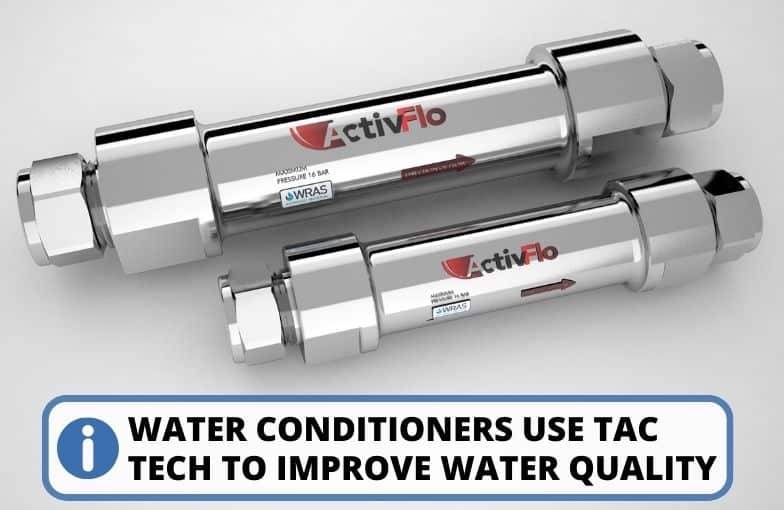
The primary discrepancy between water conditioners and salt-based softeners lies in the nature of the procedure employed. Worry not, though. I will explain the working of water conditioners shortly.
What’s the Meaning Behind Water Softening?
Water softeners treat water. It is used to extract mineral ions from it to remove hardness minerals. It is commonly dubbed salt-based water softener and employs an ion exchange mechanism during the procedure.
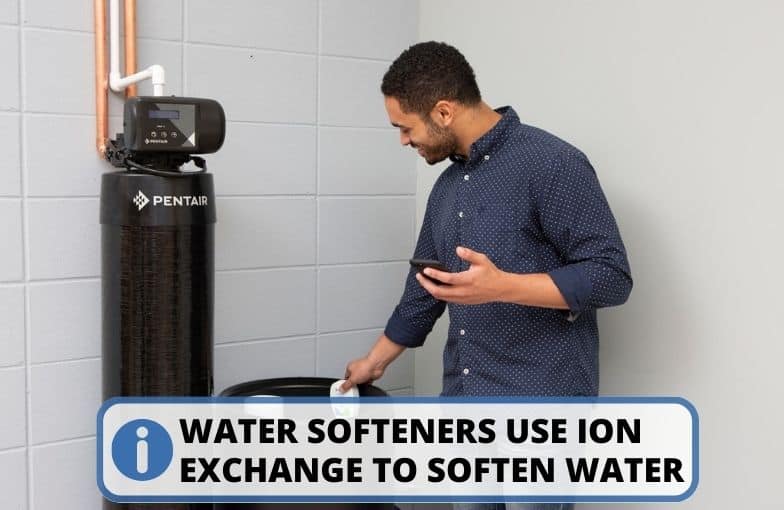
In the conventional procedure, the water streams into a tank housing a substance called resin, which retains sodium ions. Salt-based softeners get their name here because salt is employed in the procedure. I shall explain further shortly.
4 Differences in Water Conditioner vs Water Softener
It’s easy to get mixed up when someone mentions conditioner and softener. Nonetheless, there are distinguishing elements that set the two apart. Let us look at what differentiates these water treatment systems:
1. Working Mechanism
This is the major factor that differentiates the two water treatment systems. Below is a guide to give you an idea of how they work.
Water Conditioners
A water conditioner is a filter designed to enhance the quality of your home’s water supply. The three types we have include:
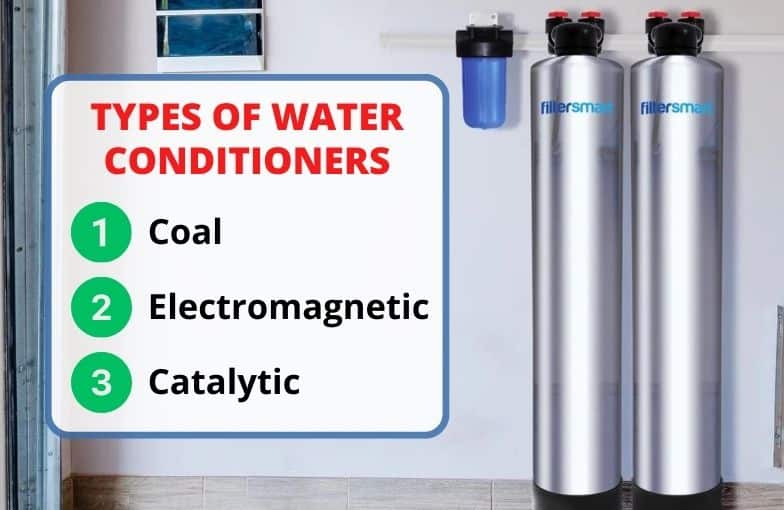
- Carbon Filtration Water Conditioners: Activated carbon is present, which removes many contaminants from the water. These filters are ideal for getting rid of sulfur and chlorine from municipal or well water. Carbon filtering also eliminates bad odors and tastes, making regular tap water suitable for drinking and cooking.
- Electromagnetic Water Conditioners: To stir up water molecules, you can use magnetized tubes or wire wrapped around the pipes. Because the carbonate salt particles are broken up and mixed with the water, the concentration of calcium and magnesium ions in the solution is lowered. Although these water conditioners do not soften the water in the traditional sense, they do minimize scaling. Water is also purified by them, with most chemical pollutants eliminated.
- Catalytic Media Water Conditioners: Can be used to soften water without the need for salt. To prevent mineral crystals in water from sticking to surfaces, these filters use template-assisted crystallization (TAC). Catalytic media conditioners are a great water conditioning solution for well water, but they don’t actually soften the water.
TAC media: The TAC media exhibit minuscule nucleation sites and polymer beads, characterized by the presence of craters. The nucleation sites function as molds. The hard water flows via the conditioner’s mineral tank, making the nucleation sites absorb the minerals.
Water Softeners
As I had earlier highlighted, water softeners are dubbed salt-based because of ion exchange.
- The ion exchange process occurs within a compact vessel with minute polyester resin beads housed within the tank.
- These beads possess salt and a negative charge, facilitating their interaction with sodium ions that bear a positive charge.
- As the flow of hard water occurs, the comparatively more potent positive ions supersede the sodium ions, which subsequently occupy the positions on the resin beads.
Role of Salt in Water Softening Process: Salt is critical in a water-softening system playing a huge part in the regeneration process. Once a specific duration has elapsed, the beads get depleted, hence unable to soften hard water efficiently. At this juncture, the necessity for regeneration arises.
Winner: There is no winner in this category as each method of operation is unique and effective.
2. The Quality of Water
It is paramount to comprehend the impact on the water quality of softeners and conditioners. Well, let me highlight this:
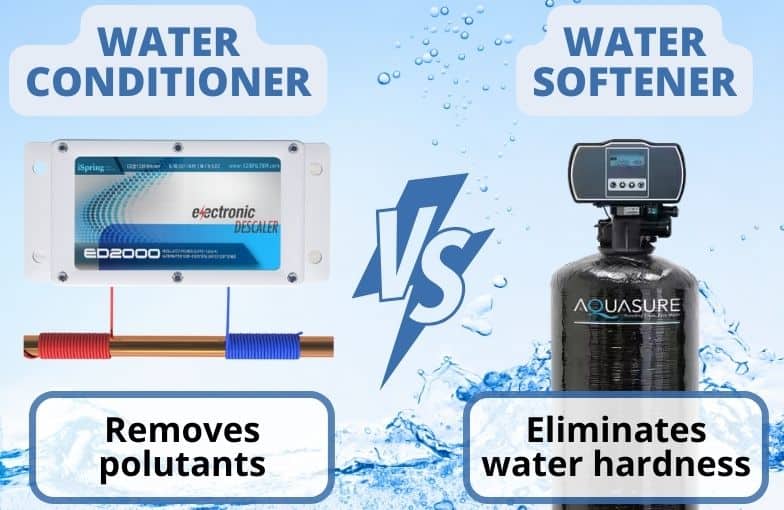
- Water Conditioner: Eradicates destructive pollutants, making the water secure for people’s use. Nevertheless, it doesn’t extract the mineral ions; thus, the water is still hard.
- Water Softener: It is exactly as the name suggests. The water becomes soft water after the procedure. The mineral deposits accountable for water hardness are extracted and substituted with sodium.
Winner: Water softener as it softens the water by removing water hardness. The water quality improves as the hardness minerals are eliminated.
3. Upkeep and Repair Costs
Let us see how the cost differs:
Water Conditioner
Conditioners are often characterized by low maintenance requirements and very affordable costs:
- The filter needs to be changed only once yearly;
- Salts are not required to be periodically refilled or for an electric source to operate.
So, water conditioner maintenance will cost you less than $100 a year.
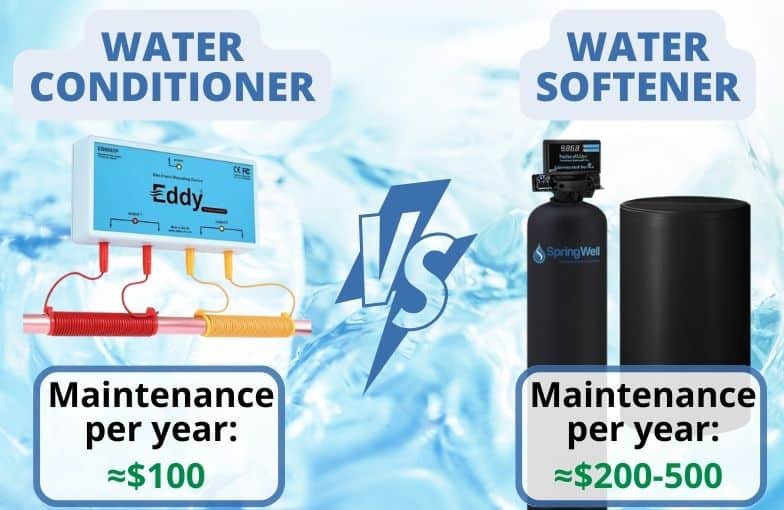
Water Softeners
As I highlighted earlier, water softeners operate on the ion exchange principle. This means that the maintenance and operation costs will be higher than for water conditioners:
- It cannot operate without electricity;
- There is a need to refill salt regularly.
Well, be prepared to spend $200 to $500 on a water softener each year.
Winner: The water conditioner is the winner as it does not require electricity. On the other hand, softeners require electricity, bags of salt, and plenty of water to operate; thus, it is expensive.
4. Amount You Will Have to Part With to Buy Your Own Water Conditioner and Softener
The cost of purchasing water conditioners and softeners is another factor that distinguishes the two.
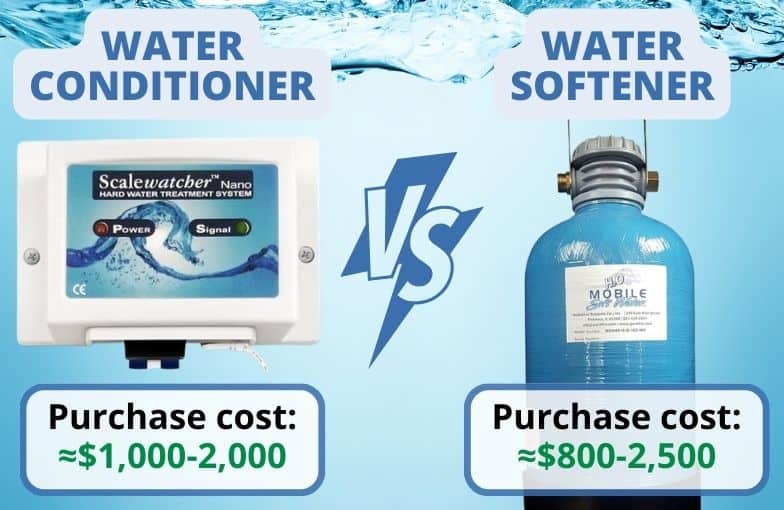
- Water Conditioner: While you can find water softeners and conditioners in any price range, the typical conditioner will cost you a few tens to a few dozen dollars, depending on the features and quality of the unit. It will cost you around $ 1,000 to $ 2,000 to purchase one, but you will not incur any extra monthly costs.
- Water Softener: The average softener, on the other hand, will cost you several dollars (hundreds). Here, you will require $800 to $2,500. There will also be an additional monthly cost of buying salt.
Winner: The winner is the water conditioner, which is more affordable than water softeners.
Now that you know what differentiates the two water treatment systems, let us look at what makes them alike.
Similarities Between Water Conditioners and Softeners
Water conditioners and softener treatment systems treat hard water, with either approach preventing adverse negative effects we discussed earlier. Their similarities include:
- They both aim to solve the problem of hard water.
- They reduce the harsh properties of hard water.
Reasons to Contemplate Employing Water Treatment Techniques with Softening or Conditioning
Millions of individuals take into consideration either softening or conditioning their water after coming across and experiencing hard water effects. But what do we mean when we say hard water?
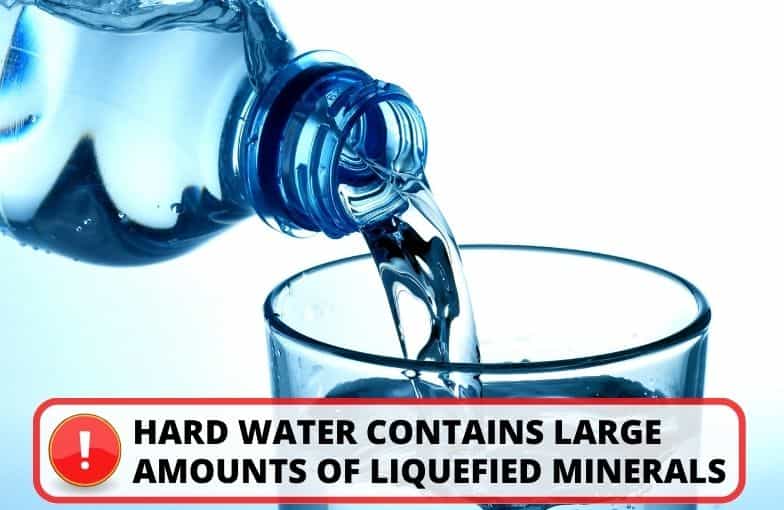
Water is categorized as hard when it possesses a vast liquefied mineral accumulation. The slow buildup of Ca and Mg ions in the water as it passes through the soil is what is thought to be responsible for the presence of hardness ions.
Effects of Hard Water Exposure
The existence of water hardness can exert significant effects on multiple aspects, like households, your body, and even business operations. Consider the following:
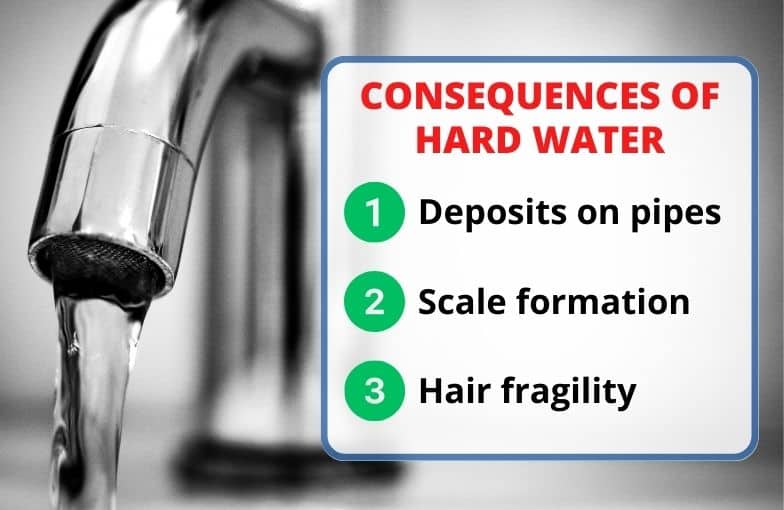
- Sediments on pipes: Hard water causes buildups on your pipes, which, when not removed, can cause their damage. This eventually resulted in huge repair expenses.
- Impact on household appliances: Due to harsh water impact scale forms on water heater and dishwasher, which eventually lower their productivity, thus shortening their durability.
- Body problems: Hard water minerals may get stuck on the body, resulting in brittleness and robbing the hair of its genuine glow.
How Does Conditioned Water Compare to Softened Water in Terms of Texture?
Let us compare the results you will get when using these treatment systems.
Water Conditioner
Minerals in water can be rendered harmless by using a water conditioner. Magnesium and calcium, which are naturally occurring in your water, are still there. However, they can be found in a form that won’t damage your pipes or electronics. Hard water can be safely neutralized, as its minerals are harmless.
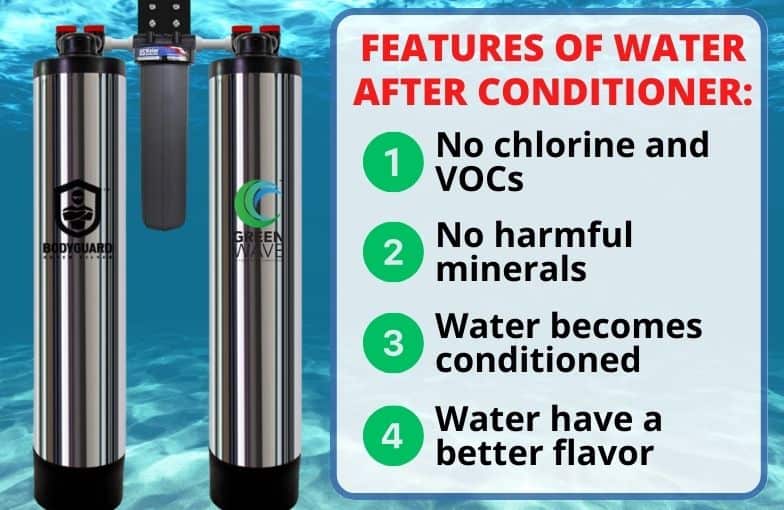
Conditioners for water are also helpful since they filter out contaminants. They may filter out harmful substances like chlorine and VOCs from your water supply in addition to softening the water. Thanks to this device, the water you drink will have a completely new flavor and aroma.
Water Softeners
To get rid of the hardness in the water, water softeners swap out the minerals in the water with sodium or potassium. A trace amount of sodium or potassium will be added to your water supply.

However, it will supply softened water, which has numerous advantages.
- Consuming soft water is not risky. Water softeners have the ability to produce enormous quantities of consistently soft water.
- Your skin and hair will appreciate soft water’s benefits, and you’ll get more use out of your water-using gadgets.
- It is very helpful in eliminating scaling from mineral deposits in heating items like kettles.
- Detergents and soaps lather better and last longer in soft water, so you can save money by using fewer of them.
- With a water softener, you may take more relaxing showers and stop worrying about water spots on your dishes and glasses.
The elimination of scale means that your plumbing and appliances will last longer.
Is It Possible to Use a Softener and a Conditioner Simultaneously?
The treated water quality is improved in both systems, which is why they exist. However, using both simultaneously may not be a good idea because they employ different technologies and methods. By this I mean:
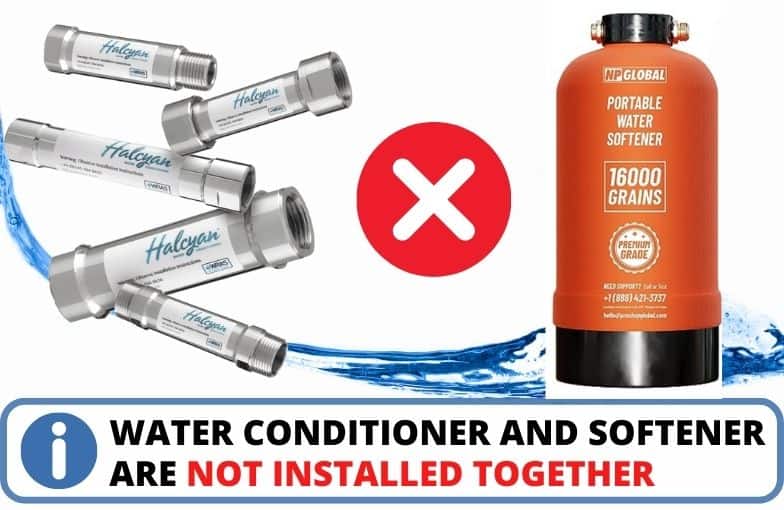
- Most water conditioning systems don’t salt to condition the water, but they change the structure of the hard mine in the water.
- It’s unnecessary to install a water conditioner after a softener. Since water softeners effectively eliminate hardness particles, there is no longer any need for a conditioner.
Because of these reasons, pairing a conditioner with a softener might not be the best idea.
Verdict! Which Will It Be? Water Conditioner or Softener?
When deciding whether to use a water softener or a water conditioner, you should weigh the specific benefits each offers. Though equally effective, each water treatment system has a slightly unique mode of operation that must be considered when trying to soften hard water.
- You want to soften water by removing hard minerals;
- You require softened water with low salt content.
- You want to filter harmful chemicals like chlorine chloramines and VOCs (volatile organic compounds) that give water an unpleasant odor and flavor.
- You want a system that uses little energy and doesn’t need a drain pipe.
- You do not want to use salt or brine tank.
- You want a conditioner that modifies hard minerals so they can’t scale when they contact surfaces.
When picking between a softener and a conditioner, it’s important to remember that the former may be illegal to use in certain areas. Brine limits prohibit the use of water treatment systems that dispose of excess brine into a sewer line. This is because high salt concentrations in wastewater can restrict its reuse.
Frequently Asked Questions
Can You Use an Electric Conditioner on Softened Water?
Electric water conditioners are unnecessary when using softened water because of how they work to alter the shape of hardness particles. Salt-free water conditioner equipment uses electricity to mitigate scale buildup caused by hard water. Thus, it is unnecessary to condition the water further using electricity after softening it.
How Long Does a Water Conditioner Last?
Usually, a water conditioner lasts longer than a decade.
How Quickly Does Water Conditioner Work?
Water conditioners usually work after around fifteen minutes to fully remove contaminants like chlorine chloramines, organic gases, and VOCs from water.
Is Water Softener Same as Water Filter?
No, a water softener is not the same as a water filter. A water filter is equipment that cleans water of harmful substances like germs, and pollutants. But a water softener will eliminate the calcium, magnesium, and other minerals that might build up in your pipes and appliances and create scaling.
Do Water Softeners Remove Fluoride?
No. Water softeners do not remove fluoride. They only remove calcium and magnesium. Flouride is removed through Reverse Osmosis Filtration systems.
Do Water Conditioners Remove Ammonia?
Ammonia is not eliminated directly by a water conditioner. Most conditioners instead work by binding to ammonia and rendering it harmless.
Do Salt-free Water Softeners Really Work?
No, salt-free water softener doesn’t soften water. Because it is the salt that plays one of the key roles in the softening process. Instead, the water is conditioned.
Conclusion
So, which is the best water treatment system for water conditioner vs water softener? The solution depends on your personal preferences. There is no wrong choice.
If you are apprehensive about the general quality of tap or well water, the most advisable thing would be to acquire a water conditioning system designed specifically for either well water or tap water.
If one is already utilizing hard water yet has concerns regarding the presence of minerals that may contribute to scale formation, implementing a water softener is recommended.

